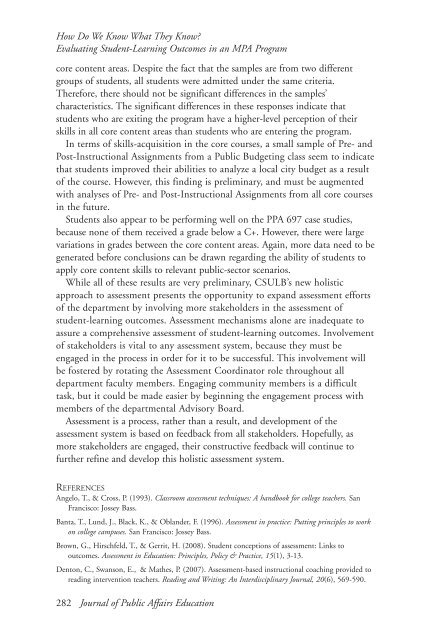JOURNAL OF PUBLIC AFFAIRS EDUCATION - naspaa
JOURNAL OF PUBLIC AFFAIRS EDUCATION - naspaa
JOURNAL OF PUBLIC AFFAIRS EDUCATION - naspaa
You also want an ePaper? Increase the reach of your titles
YUMPU automatically turns print PDFs into web optimized ePapers that Google loves.
How Do We Know What They Know<br />
Evaluating Student-Learning Outcomes in an MPA Program<br />
core content areas. Despite the fact that the samples are from two different<br />
groups of students, all students were admitted under the same criteria.<br />
Therefore, there should not be significant differences in the samples’<br />
characteristics. The significant differences in these responses indicate that<br />
students who are exiting the program have a higher-level perception of their<br />
skills in all core content areas than students who are entering the program.<br />
In terms of skills-acquisition in the core courses, a small sample of Pre- and<br />
Post-Instructional Assignments from a Public Budgeting class seem to indicate<br />
that students improved their abilities to analyze a local city budget as a result<br />
of the course. However, this finding is preliminary, and must be augmented<br />
with analyses of Pre- and Post-Instructional Assignments from all core courses<br />
in the future.<br />
Students also appear to be performing well on the PPA 697 case studies,<br />
because none of them received a grade below a C+. However, there were large<br />
variations in grades between the core content areas. Again, more data need to be<br />
generated before conclusions can be drawn regarding the ability of students to<br />
apply core content skills to relevant public-sector scenarios.<br />
While all of these results are very preliminary, CSULB’s new holistic<br />
approach to assessment presents the opportunity to expand assessment efforts<br />
of the department by involving more stakeholders in the assessment of<br />
student-learning outcomes. Assessment mechanisms alone are inadequate to<br />
assure a comprehensive assessment of student-learning outcomes. Involvement<br />
of stakeholders is vital to any assessment system, because they must be<br />
engaged in the process in order for it to be successful. This involvement will<br />
be fostered by rotating the Assessment Coordinator role throughout all<br />
department faculty members. Engaging community members is a difficult<br />
task, but it could be made easier by beginning the engagement process with<br />
members of the departmental Advisory Board.<br />
Assessment is a process, rather than a result, and development of the<br />
assessment system is based on feedback from all stakeholders. Hopefully, as<br />
more stakeholders are engaged, their constructive feedback will continue to<br />
further refine and develop this holistic assessment system.<br />
REFERENCES<br />
Angelo, T., & Cross, P. (1993). Classroom assessment techniques: A handbook for college teachers. San<br />
Francisco: Jossey Bass.<br />
Banta, T., Lund, J., Black, K., & Oblander, F. (1996). Assessment in practice: Putting principles to work<br />
on college campuses. San Francisco: Jossey Bass.<br />
Brown, G., Hirschfeld, T., & Gerrit, H. (2008). Student conceptions of assessment: Links to<br />
outcomes. Assessment in Education: Principles, Policy & Practice, 15(1), 3-13.<br />
Denton, C., Swanson, E., & Mathes, P. (2007). Assessment-based instructional coaching provided to<br />
reading intervention teachers. Reading and Writing: An Interdisciplinary Journal, 20(6), 569-590.<br />
282 Journal of Public Affairs Education
















